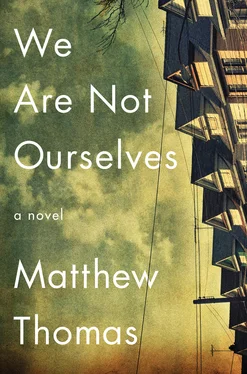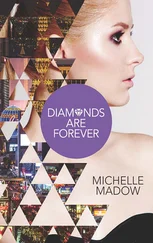The professor, a Russian American with a Mephistophelian goatee, had an amused smile on his face. This had happened before — slumbers of Connell’s punctuated by sudden outbursts of insight. Connell figured either that the professor possessed that elusive quality, the so-called Russian soul, or else that he had been similarly sleep-deprived at one point in his career himself. Something had allowed him to understand Connell’s bizarrely derelict behavior as an expression of authentic scholarship. Certainly it would have been harder on Connell if he didn’t do the reading. But to fall asleep like that in class, in brazen view of the instructor, and spring awake to provide a take that the other students seemed to chew thoughtfully on, even if they wore looks of scorn or pity: this seemed to strike the professor as being a natural mode for the study of Dostoyevsky.
Connell couldn’t help it. He never got enough sleep. He would drift off standing up, sometimes midconversation. If he leaned against a wall too long he would lose his legs and nearly topple over. There was so much to read, and the conversations he found himself in often lasted deep into the night. He watched the night owls go to sleep and pressed on.
Class let out and he went outside for the few minutes between classes to stand in front of the building. He spotted that professor he always saw with his son, a redheaded boy about four or five years old. He watched them walk across campus hand in hand, the professor gesturing around at something, the two of them stopping to watch a squirrel slip down the sloped lid of a garbage can and land in a crash of plastic containers.
He wished he had his own father with him. They could share an apartment off campus. His father could wander the grounds all day and they could meet for dinner. His father could trail him to classes. He would love the state-of-the-art labs, the brilliant students, the sense of higher purpose. His father had never gotten to hang out on a campus like this, though he’d always maintained that all campuses, in spirit, were essentially the same, that the differences between classes of institutions were more in degree than in kind.
After his second class, Connell want back to the dorm and did a little work. Then he went to dinner and rehearsal. He had gotten the part of Orlando in As You Like It , because his experience as a debater had lent him a certain rhetorical polish. The problem was, he didn’t know how to be anybody but himself, and he wasn’t sure what that self was yet, so he studied other people for traits to grab and fashion a personality out of. He liked to think this was what all college kids did, but when he ran into one of those hale, relaxed young men whose character, in the Heraclitean sense, seemed carved out at birth for him, he felt foolish and guilty. It helped that the character he was playing in As You Like It was a little naïve, because he could be breathless and overwhelmed up there and it would just about make sense.
They had spent a week choreographing the fight scenes, which were the only parts of the play he had any mastery of. He hadn’t exercised in months — was it a full year now? — but he still had a wiry energy, and he executed the flips with an ease that made him embarrassed about the rest of his performance. His father would have enjoyed watching him practice the fight scenes. He loved swashbuckling movies about adventures on the high seas, and World War II flicks with buddies fighting side by side and striding into danger.
The cast went to the Medici afterward. He found himself in the middle of a spirited conversation about the nature of free will. Several people packed into the booth, jamming him against the wall. The girls, Jenna included — Jenna whom he’d made out with a few times and who was on the verge of agreeing to make it exclusive — doted on a stage crew member whose carpentry skills lent him a virtuous concreteness in the abstracted arena of campus life.
Hopped up on an endless series of coffee refills, Connell was eating a plate of baked ravioli and idly playing with one of the sugar packets in the little tray when he was overtaken by an insight into the nature of time and space that made his mind fairly crackle. All at once, he could see the whole chain of hands through which this packet had passed on its journey to him. He could see the sugar cane growing, being gathered, being refined. He could see its manufacture. He was about to enact its consumption. He could see the future too: the packet heading to the landfill, decaying in the earth, disintegrating. In one moment, the packet in his hands didn’t exist yet, and in another he was holding it, and in another its remnants were sitting in the trash bag waiting for pickup. He knew he wouldn’t be able to explain it to anyone if he tried. The other actors were now carrying on some kind of debate about Williams, O’Neill, and Miller, and Connell was there and not there. He thought, Domino Sugar. Dad made the sugar that went into packets like this. He is holding one of these now, in the past. He could see his father looking into the future and seeing the blurred outlines of a life, a wife, a child. His father would be dead and in the ground. Connell would be too. The sugar would keep getting made.
He wanted to call his father and tell him his fevered thoughts, but he knew that even under the best of circumstances it wouldn’t have made sense to anyone, and it surely wasn’t going to make sense to his father now in the state he was in. Still, he wanted badly to share this insight, and he could feel it slipping away. There wasn’t even time to turn to the guy next to him and try to get it across, so he just formed a mental picture of his father as a much younger man, standing in a white smock, holding a clipboard, as he squeezed the sugar packet and sent the thought to that young man in his image, wherever he was in space or time. He ripped the packet open, poured it in, and watched it dissolve.
The director of his play had seen his polish and misunderstood. She hadn’t realized that polish was all he had. He could stand before people and make stentorian declamations, but the only reason he could project a convincing air of youthful ignorance was that he was stuck inside himself, and he knew he was — it was the one thing he could say with real conviction that he knew about himself — and he wasn’t playing a part.
• • •
The next morning, he woke up late again and bounded down the stairs, but this time he came down too hard on the landing and felt something snap. He hobbled to class and then to the hospital, and that night, when he showed up at rehearsal on crutches, with a broken foot, it was as if the director had been waiting for this to happen all along. There was no understudy, of course, so Connell had to play the part himself. They had to rechoreograph the fight scenes, which he and his counterpart had brought to such a high level of polish that someone suggested that when he recovered they should put on an avant-garde show that would consist exclusively of them playing out their grapplings over and over. They turned them into arm-wrestling scenes instead.
Connell felt safer, somehow, up on crutches. He had to practice walking around onstage in them, and the new physical demands of the part took the urgent edge off his desperation to remember his lines, which allowed him finally to get off book right before the show went up. It was pure chance that he’d broken his foot, but it was lovely to imagine that it wasn’t merely chance, that there was a higher order working in life, that the mystical flashes of insight born of staring at a packet of sugar in a noisy restaurant might actually connect to a truth of the universe. It was lovely to consider the possibility that he’d been somewhere else with his father, in another neighborhood of time and space, just because he’d been able to conceive of it while watching some crystals dissolve into a coffee cup.
Читать дальше
Конец ознакомительного отрывка
Купить книгу












